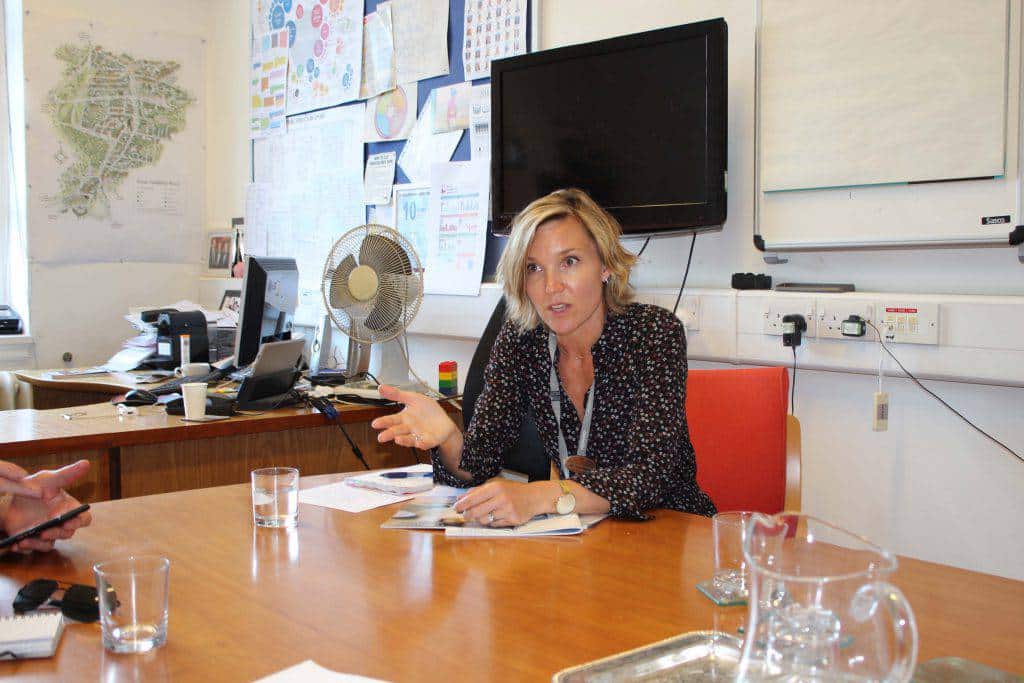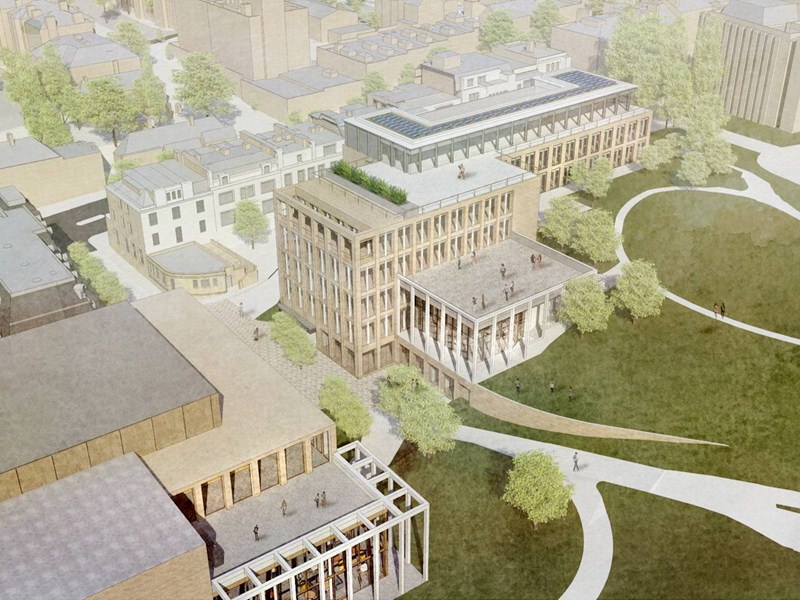Next Wednesday [July 26] the borough council debates a 1,800-signature petition calling for a rethink on plans to spend £72million on a new Civic Complex and theatre adjoining Calverley Grounds.
Last week we published arguments from those opposing a project that is one of the biggest and most controversial put forward by the council in decades. Campaigners believe it is ‘inappropriate for a public park in the centre of town’.
This week Editorial Director Richard Moore and Chief Reporter Adam Hignett put the questions to Council Leader David Jukes and Cllr Tracy Moore, who represent the ward covering Calverley Grounds

The Times: Why can’t we just leave things as they are?
Tracy Moore [TM] The ‘do nothing’ option is not cost-free, and it isn’t risk-free. Borrowing at historically low, long-term interest rates is the appropriate borrowing for long-term investments – so it’s long-term debt for long-term investments in the urban infrastructure to benefit residents, businesses, visitors and also the wider borough.
But how will it benefit us financially?
TM: At the moment, we are in the Town Hall, which is over 40,000 sq ft, and our needs are 12,000 sq ft. So we are looking to take 12,000 in the new Civic Centre and let 21,000 to a local employer.
The cost of refurbishing the Town Hall is estimated to be about £12million, and the existing use asset value on the balance sheet would be only about £4.5million. And that would still leave us with a building that is far too big, and the wrong configuration for teamwork and cross-department working.
It has long, narrow corridors with tiny offices off the sides. We have removed walls where we can, but the building is just not fit for modern working practices.
Why then would anyone else want to use it or buy it?
David Jukes [DJ]: They could take it over for alternative use. There are other institutions which would favour a building like this – scientific, educational. It could even be converted into housing, by keeping those parts which are still listed.
The whole building, although in 1936 was state-of-the-art design, is no longer feasible for the sort of organisations that we have in this century. The architect who put it together did quite a nice job, but we’ve got one boiler house, for example, which looks after the Town Hall, the Assembly Hall, the Library and the Police Station.
From an engineering point of view, it doesn’t work. We have a single pipe heating system. When you switch it on in October, it warms up by the end of December. When we switch it off in May, it’s still hot in July.
You are basically saying the Town Hall is unfit for purpose?
TM: It is unfit for purpose, and if a private developer comes in and wants to repurpose this building for a different use, with deep private sector pockets, then they would be better able to deliver than if we were to spend the money and stay in a building that isn’t suitable for us.
The efficiency and the running costs of the building are very, very high – I can’t justify that to the taxpayer. A new, modern office for us would be much cheaper to run and more energy efficient.
So you’re going to spend £72,000,000, borrowed at 3%…
TM: Probably less than 3% – from the Public Works Loan Board. Fixed for 50 years, it’s an annuity, so the principle and interests are paid back over the 50 years. And the payback for the office is 25 years, for the car parking it is under 50 years, and I think that it is justifiable borrowing for long-term investment in an urban infrastructure.
And remember – the cost of doing nothing is not free. The cost of staying in this building is, at least, £12million to refurbish the Town Hall. It is north of £30million to refurbish the Assembly Hall Theatre, to get an audience capacity of 1,200. But you still have the constraints of the wings, the stage, and the fly tower being too low.
The foyer space and bar are also too small for the circulation of an audience of 1,200. So we’re unable to increase the size of that theatre, or to put our 1,200-seat theatre on that footprint. It does not fit, and it is a myth that is being proposed to the public by others.
You’re never going to make money running a theatre
TM: Well, exactly. But it is estimated that there is at least a £14million per annum economic benefit to our local economy [by having a new theatre].
How is that calculated?
TM: This is based on the Shellard Formula, which is nationally recognised as the way of calculating the economic benefit of culture.
It’s what was used to estimate the benefit to Canterbury when the Marlowe Theatre was built, and actually, the economic benefit has exceeded the Shellard Formula in Canterbury. Â
In its current state, our Assembly Hall Theatre is estimated to give just under £4million per annum economic benefit to the town.
So those who say we should close the theatre [and build a new one on the site] are wrong. It would be closed for at least three years.
Which would mean losing, over three years, £12million?
TM: Exactly. Losing just under £4million per annum economic benefit to the town while the Assembly Hall Theatre is closed. You also lose your audience because they are going to go elsewhere to get their culture. So then, when your refurbished theatre reopens, you have to rebuild your audience from zero, rather than trying to achieve audience regrowth. And you also risk losing staff and expertise. 
Have you got a potential corporate client lined up for the Civic Complex?
DJ: Do we have any tenants? Yes, we do, but I’m not telling you who it is because we have five years before it is actually going to be open and we have got two parties seriously interested.
TM: It’s very difficult to sign up tenants to a building where you don’t have full council consent to even apply for planning permission.
The point I want to make is that borrowing £72million makes some people a bit nervous.
But I compare it to the same way I borrowed for my university education – it was investing in my future. People borrow to buy a property and their mortgage is then what they pay back for that asset.
Other local authorities in Kent have borrowed to invest in their local areas. We have less than £7million in debt and over £100million in assets. This is a very, very well run organisation. Look at other authorities that have borrowed – Ashford recently borrowed £75million to invest in a hotel, cinema and leisure complex. Canterbury has £180million of debt, Dartford £64million and Dover £84million. But Canterbury borrowed recently £74million specifically to buy half a shopping centre. Other areas are investing in their future and I think that it is appropriate and responsible for us to do the same.
Are you saying that financially it’s a no-brainer?
TM: When I talk to my peers – middle-aged people with school-aged children – I hear ‘no-brainer’ all the time. They think it is a really sensible thing for us to do and to get on with it.
Why then is there a public backlash? Why are you sitting here having to defend it?
DJ: Because a handful of people that it might impact upon have set up a petition when they should really have declared an interest. People around this part of the world would sign anything. They put it online and anybody can sign it; they don’t have to put their name and address on it.
Do you think you have been good enough in packaging and selling the development?
DJ: I’m not a project developer, I’m not a venture capitalist, as you report occasionally. I’m an electrical engineer, but I’m also a project manager, and I build things. So I’m pretty good at building them, but I’m not necessarily good at selling them. Hence, Councillor Tracy Moore has come in now to help us out with that.
TM: There are two things about the petition. One, that the people who started the petition do live adjacent to the potential development site, or the park of Calverley Grounds. So there is probably a vested interest or, dare I even say it, possibly a motive to that.
And secondly, I would also say that some of the assertions made in that petition are frightening. I can understand people signing a petition with those claims. But much of it is misinformation and inaccurate.
We are looking to build on less than 2 per cent of Calverley Grounds. It is not encroachment of the park. It is not concreting over the park. It is building on two car parks that currently exist, and actually, Historic England thinks we would be improving and healing the edge of Calverley Grounds with these two new buildings.
We are looking to put a publicly accessible roof garden on the council chamber element of the building, with a new pathway to lead the public to that garden plus a wider, more welcoming entrance to the grounds. So instead of encroachments, it is actually enhancing and protecting our asset. Which is what we’ve done with all of our other parks.
Why is most of the political opposition from people within your Conservative group?
DJ: Well, oddly enough, I’m getting a lot of support from the political opposition.
But there seems to be quite a hardcore resistance in your own party…
DJ: Well, a lot of it comes from outside Tunbridge Wells with people from places such as Sissinghurst, Cranbrook, etc, asking: ‘What’s in it for us?’ I can understand that, up to a point. They’re 20-odd miles away, but the theatre is still there for them to attend. It’s like the people from Crowborough and Heathfield – they come quite a lot.
What about calls for a wider referendum?
DJ: Why should we have a referendum? We’re elected to make decisions on behalf of the public. Why should we put it back to them to make decisions?
TM: One of the members that has asked for a referendum has been a councillor for over 18 years. This is the first time he has been asked to make a really difficult decision, and to show civic leadership. And I think some people are daunted by the challenge.
What they want to do is absolve themselves of responsibility by appearing democratic and kick it out to the people to referendum. We’ve been elected to lead and represent.
…and to inform?
TM: And to inform. And I have said for a while I think we can improve communicating the message, because I think this is a fantastic project and I think people need to be informed so that they can show their support.
Are rows like this going to put people off taking an interest in local politics? Are the rows going to make councillors gun shy?
DJ: We are going to end up with a situation if we keep on getting this flack – all right, I’m a tough old bird and I’ve been around the world and I’ve been insulted by experts – but if it continues along these lines politically, and not just in Tunbridge Wells but nationally, people aren’t going to stand for public office at all.
TM: I don’t know if there’ll be another opportunity to take on a project like this again. Rather than people being too ‘gun shy’ to show this kind of leadership again, I think the question is ‘Will people want to stand for public office?’
The level of personal, and quite vicious, attacks that David [Jukes] has had to endure is really inappropriate.
I, myself, stood for election because, instead of just complaining about things, I wanted to try and make a difference and get involved.
But it’s very difficult seeing personal attacks in the papers or in emails. When I look around the Council Chamber, the vast majority, if not all, are there because we live or work in the borough and want to make this a better place.
There might be a lack of consensus on how to do that, but I think people are in it for the right reasons. I think that the vocal opposition, which I believe to be a minority, could possibly put people off from wanting to stand for election again. Or even standing in the first place.
Are you surprised by the reaction?
TM: I don’t think that the vast majority of people are actually against the plan. I think those that are, are organised and they are very vocal. I have been into three secondary schools in the last ten days, and these teenagers, lower sixth, were broadly enthusiastic about the project – about making sure Tunbridge Wells continues to thrive.
What happens on July 26?
DJ: We’ll put up a motion which will, more or less, say that we take note of the petition and we will try and accommodate the relevant points which will come up from that petition. Because, as you know, most of the facts that were put into the petition are wrong anyway: ‘20% of Calverley Grounds to be covered by concrete’ – hang on.
What would you say to the suggestion that this is a David Jukes vanity project?
DJ: I have built bigger vanity projects around the world. This one I’ll add to my small works department.
I just hope that my grandchildren and great-grandchildren will enjoy this facility, rather than go to London on whatever transport links there are in those days.
TM: I think we have a duty and responsibility to invest in the future prosperity of Tunbridge Wells. Rather than being a vanity project, it’s about trying to invest to ensure the town continues to thrive.
The final question then – is it all going to be built?
TM: Well Full Council have to agree that. There is no certainty that after we receive the stage three report [on the project] that we will have enough votes to get it through. But it would be a lost opportunity for future generations if councillors don’t show the initiative.
DJ: It will be applauded once it is built. Believe me…
For the views of those opposing the development see the Times Wednesday, July 12 [pages 4-6] online at www.timesoftunbridgewells.co.uk Â








